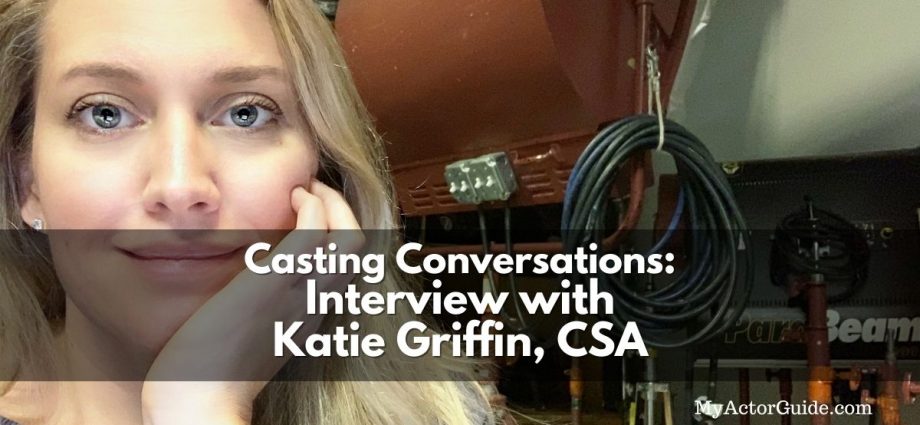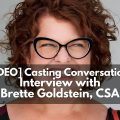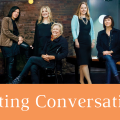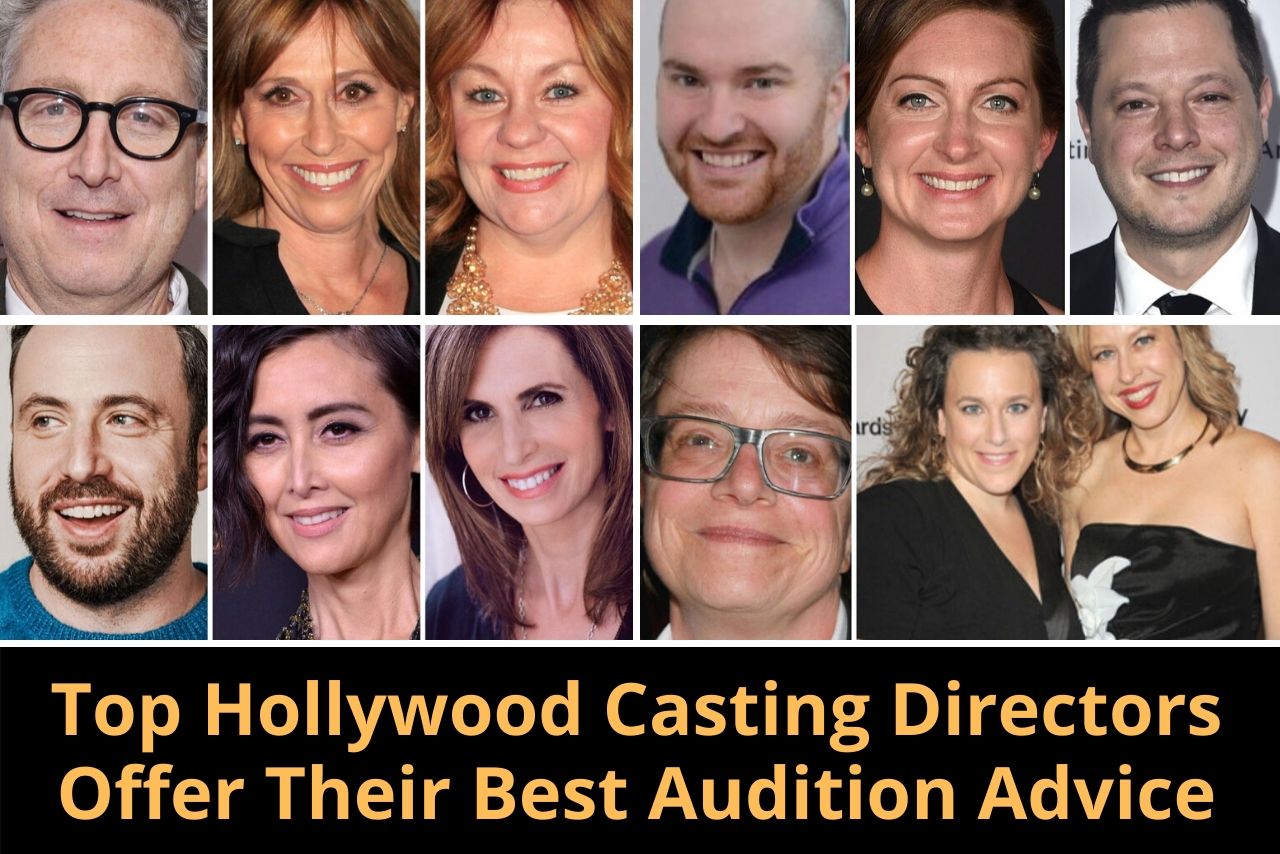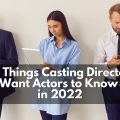This post may contain affiliate links, so I may receive a commission, at no cost to you, if you make a purchase through a link. Check out the disclosure for more info. And thank you for supporting free content!
You guys are in for a treat! I was able to catch up with veteran Casting Director, Katie Griffin, who generously shared her insights on a wide range of topics including do’s and don’t for audition, headshots and resumes, and even voiceovers. You might know Katie from the #hellomynameis challenge she create on Instagram. She has cast for big names like NBCUniversal, Nike, RCA, TLC and more. So much wisdom here, you’re going to want to read this one twice! Enjoy!
As a classically trained actress, tell us a little bit about your journey into casting?
I was a child actor with big dreams of being on Broadway. I studied at University of Miami’s Musical Theatre Conservatory. After graduation, I assisted a Casting Director in Miami to get my foot in the door as an actress. I was finding that the people who I was casting in my mind were actually getting booked for the roles. So I thought, “I might have a knack for this!” I assisted on a handful of feature films, television series and commercials and I truly fell in love with being behind the camera. I then moved to New York to pursue a career in Casting.
I love the #hellomynameis challenge you recently launched on Instagram! What inspired you to create that?
Casting’s first impression of an actor comes from their slate because it’s not only a way to introduce yourself to us but it shows us your personality, your level of confidence & professionalism. It also sets the tone for how the rest of your audition will go. I created the #HELLOMYNAMEIS challenge as an opportunity for talent to polish their slates while they were already working on their self-tape auditioning skills in quarantine. It was a chance to get back to the basics. I’ve hosted a few challenges during quarantine for actors to keep those skills toned!
You have cast some huge names in commercials! What are some of the big differences with commercial casting and film or episodic casting?
Having cast commercials, films and episodics, I conduct casting sessions in the same way. In all of my years, I’ve witnessed a lot of talent not take into account that commercial scripts should be treated like a monologue or scene. You still need to have a clear understanding of your own character, who your scene partner is and what your intent is – to influence and persuade – and most importantly your lines MUST be grounded in reality so you can commit to what you’re saying and so your audience believes you. In commercial casting, oftentimes talent isn’t given much (if any) context with sides. But it’s incredibly important that you create the circumstances for yourself if context isn’t provided so you believe what’s on the page and deliver your most honest performance.
I noticed you do a lot of children’s scripted television, how does the onscreen casting process work for child actors and adults?
The format of my in-person casting sessions are always the same. Adult or child actor, I give the same level of attention and energy to everyone who comes into my castings. I do treat the children a little differently, however, taking them aside and helping them remain calm because their parents aren’t in the room. There’s a bit more hand holding because they’re children but I speak to them like we’re on the same level and they respond well to that. Every child who comes through my audition doors is told what a wonderful job they did in their audition. When I was a child actor, I didn’t receive that kindness and attention, so my mission now as a Casting Director is to create a positive experience with casting. Positive experiences build children’s self-esteem and create positive memories for life.
You have been described as a “unicorn finder,” what is your “secret super power” as a casting director?
I was interviewed for a lifestyle magazine and the editor said, “You know Katie, I think you’re a unicorn finder. You find the most unique people for every single project.“ It stuck. I have a massive database of talent and personalities I’ve met over the last 20 years. When I’m not finding those unicorns, I’m helping actors find the unicorns within themselves.
I guess my secret super power is empathy because I’ve walked in the actor’s shoes. I know exactly what it’s like to stand on a mark, get sweaty palms and cotton mouth and even forget my name. Auditioning can be nerve wracking at times and I always want talent to feel comfortable when they audition for me. I want them to know that I’m always rooting for them!
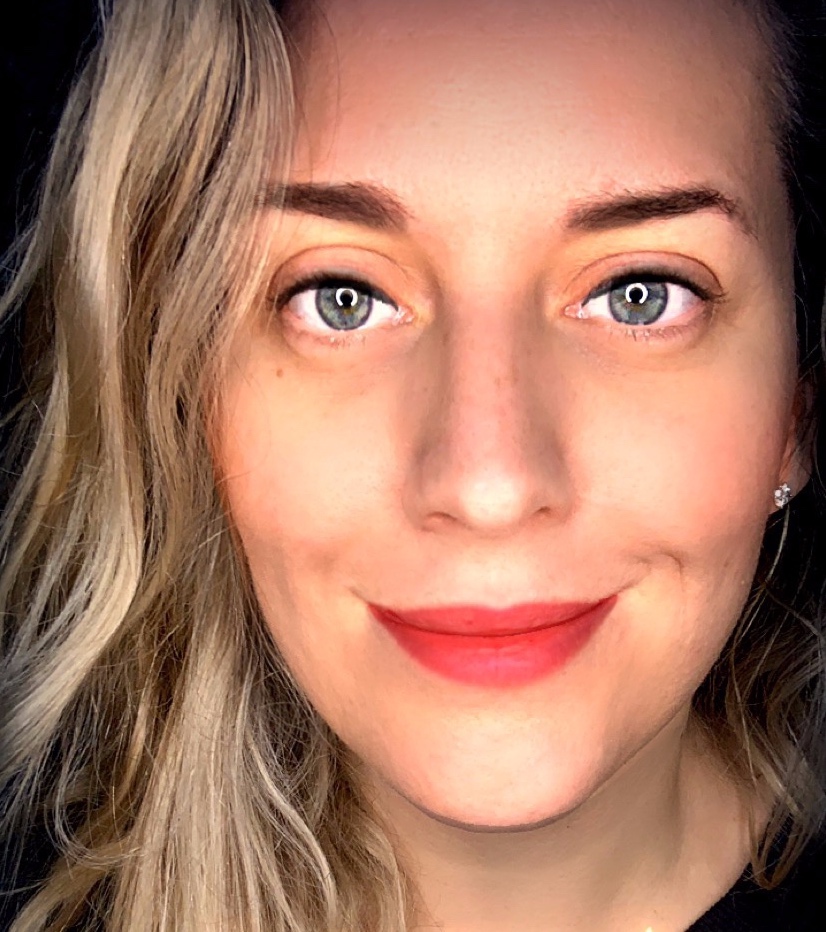
What are the 3 big Do’s and Don’ts for actors auditioning for you?
Katie’s Do’s
- Arrive early with plenty of time to sign in, review your sides and get your bearings.
- During your slate, please show us your personality (the real you) before you dive into character with your lines.
- Please remember that Casting Directors want you to win. We wouldn’t bring you in if we didn’t think you were right for the roles you’re auditioning for, so please try to have the same confidence in yourself that we have in you. We’ve got your back when you walk out that door.
Katie’s Don’ts
- Do not arrive to the casting session at the time of your appointment. Arriving at the time when you’re supposed to be standing on your mark means that you’re late and it throws off the audition schedule. In many cases we have packed schedules and ask that you please respect timing.
- When you come into an audition, please do not make any apologies. I can’t stress enough that you should never start off any interview (which is what an audition is) with an apology. By apologizing you’re starting from a place of weakness rather than a place of confidence or strength. So act like you’ve already booked the job and we’re simply rehearsing!
- Unless requested, do not come into the audition “in character.” Casting Directors and clients like to have genuine conversations with talent before the audition begins. We also like to get a sense of your personality and professionalism before you dive into your role.
What is your advice to actors putting together really solid packages – headshots and resumes?
Make sure that your headshots are current (within the last 2 years) and that you haven’t changed your look dramatically. If you are getting new headshots, preselect your looks and confirm that the photographer shoots with natural light in addition to studio lighting. Your resume should have your name larger and bolder than any other text on the page, so Casting can easily find you at the end of a session. After you’ve listed your credits and training on the resume, don’t forget to list your special skills. And please list your special skills in some form of sequential order so our heads aren’t buried in your resume during your audition.
What’s your best advice for nailing a self tape audition?
Great lighting, a nice landscape shot and delivering a super friendly and genuine slate will help you nail your self tape audition. Follow the instructions that are included in the breakdown and send your self tape closer to the date you’ve viewed the breakdown rather than waiting to send it closer to the deadline. The reason is that you may experience technical difficulties and could potentially miss the deadline if you’ve waited too late to deliver your materials. Digital castings are far more labor intensive than in-person casting sessions. So those who’ve waited to submit after the deadline run the risk of not being seen by the client at all because we’ve got to meet our own deadlines.
I noticed you also do casting for voiceovers; how is that industry been affected by the pandemic?
When the pandemic halted on-camera work 4 months ago, the VO market became flooded. Clients moved in this direction because they’re able to promote their businesses while not putting any on-camera talent at risk. Having a home recording studio gives VO artists a great advantage. They’re able to record remotely and directly interface with the clients instead of going into studios. If you were thinking about getting into VO, now is the time to explore the VO business and the audio equipment that’s needed. Great voices can be lost with bad equipment, but make no mistake: great equipment doesn’t make a good VO artist. You’ve got to get training first.
And in terms of demo reels, have a bunch ready to go either on your website or on a digital platform so you can easily send Casting links for a quick listen. The world is your oyster with VO. JUST make sure that the quality of the demo reel is totally professional.
Are you currently conducting virtual casting sessions? And if so, how do those work?
Yes! I’ve been hosting digital castings and virtual callbacks during the pandemic. That’s the formula I’ve created and my clients prefer. I’ve been running my digital casting business this way for the last 5 years so no interruptions or changes have occurred with my casting process.
What’s your take on the current climate of production? And what can we expect next / moving forward?
I’ve been so tapped into the state of our industry and I’ve been sharing info on my social media accounts as I’m reading headlines in real time. What’s wild is that Variety and other media outlets have called this the Great Depression for Entertainment. Our industry is typically recession proof but given the fact that most of us cannot operate without crowds of people or tons of crew on a set, we are all affected. I don’t see the industry as a whole getting back to normal until a vaccine is widely available. What does that mean for us? We have to be adaptable with how we’re participating in casting sessions and producing content.
What advice would you give someone wanting to get into reality TV?
Know exactly why you should be on reality television, what makes you a character and what about you needs to be watched in households around the world. The majority of the casting I was doing in the early 2000s was for reality television and I’d often hear, “People tell me all the time that I should have my own reality show.” My initial response would be, “Why?” It wasn’t to cut anyone down. I would ask this question because it’s the very first question a network executive will ask you in a pitch meeting. And you’ve got to come thoroughly prepared to answer Why, What, Where, When? Here’s an insider tip: If you intend to be a reality TV personality, learn to speak in soundbites and keep practicing.
If an actor hasn’t been in your office yet, how can they get on your radar?
Since March 15, I’ve received over 4,000 emails from talent. Because I have more availability than I did pre-pandemic and I want to respect every actor, I spend 2 hours a day responding to talent. However, given the sheer volume of messages, I’m over a month behind in my responses. So to grab my attention, follow and tag me on social media. I’m typically hanging out on social media between sessions and meetings.
You have strong industry connections with organizations for empowering women and girls, why do you feel that is so important today?
I was raised by a single mother who did a phenomenal job playing the role of Mom and Dad. She was a superhero to me. My mother raised me to believe that there were no limits to my goals, to always know my worth and never settle for anything less. I attended an all-girls school high school which promoted the power of the female gender through education. That’s where I found my magic. I now serve as a Board Member empowering the next generation of young female alumnae. After I graduated from a cut throat college conservatory, I knew I needed to be fearless and tenacious if I wanted to be taken seriously when meeting with network executives, pitching show ideas or reaching out to celebrities for appearances. I became acutely aware that as a young woman in this industry, I needed to put in more hours, stay later at the office and double and triple check my work so I could be seen as an equal. Where I stand 20 years later, I’m pretty comfortable with who I am as a woman and as a Casting Director. I’m an advocate for the empowerment of women and young girls. I believe that all women win if we’re lifting each other up, whether they’re our competitors or not.
Do you ever teach classes and is there anyway for actors to work with you directly or get coaching?
In March, I opened my schedule to offer free general sessions to professional actors in response to the devastating hit our industry took when COVID-19 halted our work in studios, on sets, on stages and on location. With my free sessions, I provide talent as much feedback as the 10 minute appointment allows on their monologue or commercial copy or headshot and resume. I also provide direction and guidance for creative outlets during quarantine. I’ve met with talent across the country and around the world. It’s been an incredible experience. I’ll continue offering free 10 minute general sessions to talent until the quarantine is lifted.
For more information, head to my site: KatieGriffinCasting.com/together
Please note that this program has become incredibly popular and the calendar books up quickly. Stay tuned on Instagram for notices of a few available appointments I release weekly. To allow as many talent the opportunity to meet with me, only one appointment for this program will be honored.
If you’re interested in more in-depth work with me, I’m offering 30 minute virtual sessions at a discounted rate. These one-on-one sessions can be totally personalized, so you can use the time to cover whatever immediately needs my professional guidance and input. For more information, head to this link: Calendly.com/KatieGriffinCasting/30-30
I typically teach workshops once a quarter with updates shared via newsletter. That’s where I also keep actors up to date on my projects. To be added to the newsletter, please head to my homepage KatieGriffinCasting.com and fill out the contact form.
Is it okay for actors to contact you directly or do you prefer them to go through an agent? And if they can contact you, what’s the best way?
If you are an actor repped by an agent, please have them connect with my office rather than connecting with us directly. We are respectful of the relationship built between an agent and their talent and we want to honor that. Otherwise, I only accept submissions on a project basis. Please keep in mind that we receive thousands of submissions and I don’t want you to become lost in the mix. If you’d like to connect with me over social media, head to Instagram.com/KatieGriffinCasting
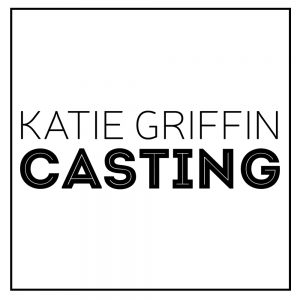
Casting Director Katie Griffin has credits across multiple genres including studio feature films, national commercials, children’s television, music videos, reality TV, voiceovers and public service announcements. She has handpicked talent for power players such as NBCUniversal, Nike, RCA, TLC and Justin Timberlake. Katie is a member of The Casting Society of America and The Producers Guild of America.
Find out more about Katie at:
- KatieGriffinCasting.com
- IMDB
- Instagram.com/KatieGriffinCasting
- Facebook.com/KatieGriffinCastingDirector
- Twitter.com/KGriffinCasting
Love this article? Find it useful? Share it. Pin it. Tweet it. Send it to you actor friends who could use the advice! Questions or feedback? Head to the comments below!

Looking for more auditions? Read 11 FREE Audition Sites Every Actor Should Know About
* Please Note: I am not an agent, manager, or casting director. I do not procure work for actors. All information, workshops and coaching are for educational purposes only and are not a guarantee or promise of employment. Thank you for being here!

